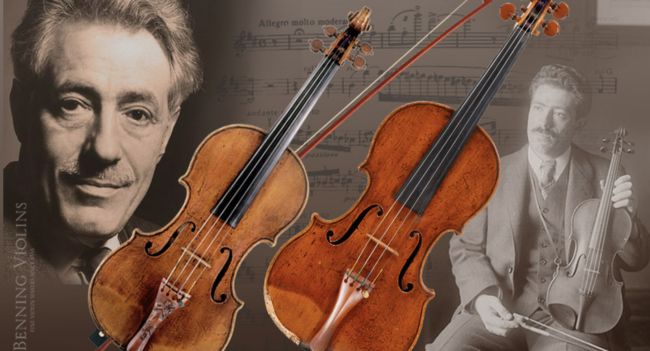Fritz Kreisler was one of the most naturally gifted violinists of his time. Born in 1875, he composed and performed haunting, romantic melodies that became huge hits, becoming world-renowned for his expressive phrasing and emotive style. He also ran what is largely considered one of the most elaborate hoaxes in musical history.
Growing up, Kreisler’s father was a keen violinist, and the entire family would band together for music nights that often ended with a young Kreisler playing a makeshift violin fashioned out of a cigar box. Perhaps a sign of things to come, his first major accomplishment was borne out of a lie. Kreisler was the youngest ever student to attend the Vienna Conservatory because his mother lied about his age. By age ten, he’d already breezed through training and won the conservatory’s gold medal. He was soon transferred to Paris to learn from Delibes about composition.
Aged 12, he won one of the most coveted prizes in classical music, the Premiere Grand Prix de Rome gold medal. He had competed against almost 40 other players, who all had a decade of experience with him. It was a success on such a blinding level it was almost bizarre. After his big win, Kreisler went on to tour America, where it became clear that not only was he a musical sensation but a gifted showman, too.
When he returned to Austria, he was rejected by the Vienna Philharmonic Orchestra. After having such a strong start in classical music, the rejection was so alien he briefly abandoned music altogether for a time, studying medicine and then joining the army. “In those youthful days, I had some very weird thoughts about my future career,” Kreisler said. “I envisaged myself operating on a patient in the morning, playing chess in the afternoon, giving a concert in the evening, and winning a battle at midnight.”
The real battle taking place seemed to be with his ego, but Kreisler recovered enough to perform with the Berlin Philharmonic in 1899. It was his second act, and from the early 1900s, he was deemed a virtuoso violinist. But it wasn’t his light touch on the strings or his intense vibrato that he’s remembered for. Whilst on a tour of Europe, Kreisler claimed to have discovered unheard works by the likes of Wilhelm Friedemann Bach, Giovanni Battista Martini, and Antonio Vivaldi. Their music became a signature element of his show, with audiences amazed not only that he could play the masters so well but also that he had unearthed them from libraries and monasteries all over the world.
In truth, Kreisler had written them all himself, lying to create a buzz and then profit off of playing these pieces perfectly. Strangely, he wasn’t even reluctant to admit it, and it was only when a New York Times critic outright asked him in 1935 that it came to light.
“The name changes, the value remains,” was his cool response, which caused an uproar he likely didn’t anticipate. Somehow, he walked away from the hoax with his reputation intact, likely owing to the fact he had the innate skill required to convincingly fake the songs in the first place. If anything, he proved, incredibly publicly, that he was as capable a writer as he was a player.
In the early part of the 20th century, Fritz Kreisler was considered one of the leading violinists of his time.
Extraordinarily talented, he started his musical studies at age 4, and was admitted to the Vienna conservatory at age 7. He took violin lessons with Hellmesberger Jr., studied theory with Anton Bruckner, gave his first public performance at age 9 and graduated at 10! After further studies at the Paris Conservatory — violin with Massart and composition with Delibes — Kreisler embarked on an exceedingly hyped but less than successful concert tour of the United States. So he came back to Europe and abandoned music in favor of a career in medicine, and he also served as an officer in the Austrian army. Yet eventually, he returned to the concert stage and his appearance as soloist with Arthur Nikisch and the Berlin Philharmonic on 1 December 1899 launched his international career.
Kreisler performed to critical acclaim and huge popularity around the world, and Elgar composed his Violin Concerto for him. Kreisler was at the vanguard of the emerging music recording industry, and he delighted audiences with performances of lost classics by famous composers. According to Kreisler, he personally had discovered manuscripts of unknown compositions by Corelli, Pugnani, Vivaldi, and Couperin in a French monastery. Audiences would flock to Kreisler’s solo recitals to hear yet another unknown masterpiece, and these lost classics quickly entered the repertoire of other performers as well.
On Kreisler’s 60th birthday on 2 February 1935, the New York Times music critic Olin Downes sent him a telegraph wishing him a happy birthday. He jokingly asked if he himself was actually the composer of all those “lost classics” that had made him so famous. To his surprise, Kreisler unapologetically confirmed that he had been the composer all along. The music industry was outraged, probably because they had ever so willingly allowed themselves to be deceived. Kreisler pointed out “that should make no difference who wrote the works as long as people enjoyed them. The name changes, the value remains.” Clearly, audiences agreed with Kreisler’s assessment as his popularity skyrocketed following the scandal.
Fritz Kreisler: “Pugnani” Preludium and Allegro
